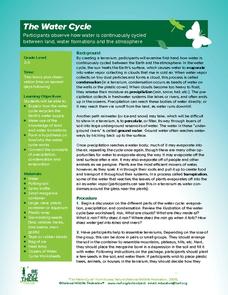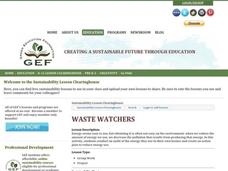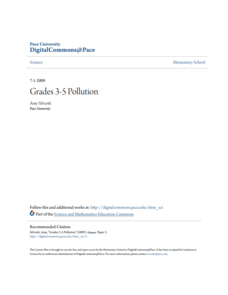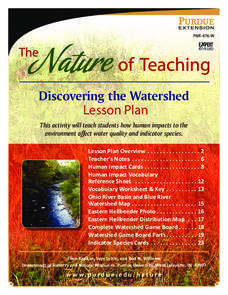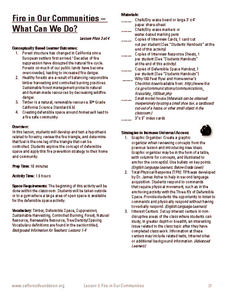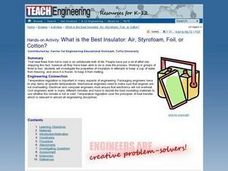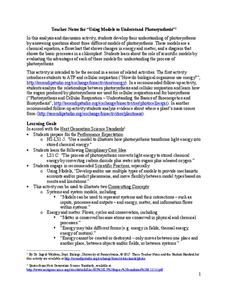Curated OER
The Water Cycle
Learners are introduced to the components and importance of the water cycle. They are shown how groundwater moves using a model. Students list 9 places on earth where water is found. They define the terms cycle and water cycle.
Curated OER
Water
Students create a water filter according to given criteria. I this chemistry lesson, students evaluate the importance of water in their lives. They develop a book or brochure on the water treatment process.
Curated OER
Water and Ice
Students observe what happens to water as it goes from a solid to a liquid. In this exploratory lesson plan students gain an understanding for the water cycle while working in groups observing what happens to water as it changes state.
Curated OER
Fighting Corrosion to Save an Ancient Greek Bronze
Study corrosion on bronze statues with a hands-on lesson plan. As pupils place a penny in water with salt, they observe the changes in the penny throughout a period of a week. They then analyze the pre-conservation and the...
Curated OER
A Sea Turtle Experience
Students observe live green sea turtles and use their imagination to form questions about the animals. They present these questions to their teacher. Students then complete the activity sheets highlighting sea turtle biology and...
Curated OER
Hos Do the Jaguar and Howler Monkeys in Belize Depend on Us?
First graders access the internet and use the sites provided to research Belize, and in particular, the Howler Monkey and Jaguar. Students participate in activities/centers utilizing the information they discovered.
Curated OER
Waste Watchers
Energy-aware learners conduct an audit on their electricity usage by recording their electric meter reading and assessing the thermostat, light bulbs, windows, and water heaters in their homes. In class, they analyze results and discuss...
Curated OER
Protecting the Critical Habitat of the Manatee and the Loggerhead Turtle
First graders research Belize and its landscape and animals on the included internet sites. The students complete activities/centers across the curriculum utilizing the facts they discovered.
Curated OER
Fresh or Salty?
Students explore water bodies on the planet Earth and their various uses and qualities. They examine several ways that engineers are working to maintain and conserve water sources and think about their role in water conservation....
PBS
Blow the Roof Off!
Blow the minds of young scientists with this collection of inquiry-based investigations. Based on a series of eight videos, these "hands-on, minds-on" science lessons engage young learners in exploring a wide range of topics from making...
Pace University
Pollution
Over the course of 10 days, scholars take a pre-assessment to place them in one of three leveled groups. Whole-class and in small groups, pupils take part in read-alouds, field trips, hands-on activities, and complete learning contracts...
Purdue University
Discovering the Watershed
Human impact on watersheds can make or break an ecosystem. Learners use a game to learn about the impact human choices have on water quality and the organisms that depend on it. The activity includes a game board and game cards that tell...
Forest Foundation
Fire in Our Communities - What Can We Do?
Learn about defensible space and renewable resources with a lesson about forest fires. After exploring the ways that humans have impacted the environment, kids conduct mock interviews about differing points of view in the conservation...
Environmental Protection Agency (EPA)
Matching Fun Facts Game
A fun and quick way to either assess understanding at the end of a water conservation unit or to introduce the topic, learners play a quick matching game online. In the matching game, users must type the letter that corresponds with the...
Project WET Foundation
Explore Watersheds
What makes a watershed? What are the natural and human features of a watershed? How do human features affect watersheds? Where can I find my local watershed? These questions are thoroughly explained in an informative watershed interactive.
Sea World
Arctic Animals
Discover the coldest animals in the world with a lesson about the Arctic habitat. Kids use a glossary and information sheet about animals found in the Arctic Circle to complete several activities, including tracking the lemming...
Curated OER
What is the Best Insulator: Air, Styrofoam, Foil, or Cotton?
Students investigate the properties of insulators by attempting to keep a cup of water from freezing, and once it is frozen, to keep it from melting. They conduct the experiment, record and analyze the results, and answer discussion...
Serendip
Using Models to Understand Photosynthesis
Is your class in the dark about photosynthesis? Shed some sunlight on an important biological process with a thoughtful activity. After answering questions to help determine their level of knowledge, learners work with chemical equations...
American Chemical Society
Controlling the Amount of Products in a Chemical Reaction
Everyone enjoys combining baking soda and water. Here is a lesson that challenges scholars to analyze the reaction three different ways — the real substances, the chemical equation, and the molecular models. Class members experiment to...
Curated OER
How Can We Conserve Water?
Young scholars describe the importance of water conservation and list ways to conserve. They construct composts and fill them with materials that recycle nutrients. They inspect their homes for leaky pipes, toilets, and faucets.
Curated OER
Earth Water Distribution and Water Consumption
Students explore the need for conserving fresh water and understand that it is a limited supply. In this water consumption lesson students participate in an activity and answer questions.
Curated OER
I'm Warm Now
Third graders graph how much water is wasted while waiting for it to get warm in the spigot in the sink. In this graphing lesson plan, student first predict how much water is wasted. That night they test it out at home and the next day...
Curated OER
Eye On Conservation Drainage Basin
Middle schoolers are able to describe the importance of wetland vegetation. They describe the impacts human activities have on water systems. Students compare and contrast the effect of different soil types on water filtration.
Curated OER
Testing the Water
Students develop and test a hypotheses through collecting and recording water quality data. They perform their tests outdoors in a location with a safe stream and easy access for students. Their various experiments involve the entire...


